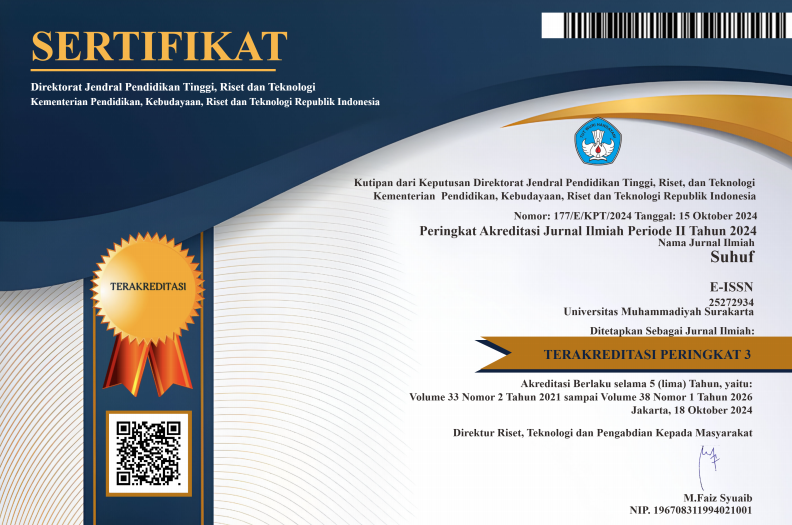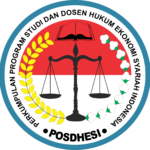Modernizing Zakat in Indonesia, from Masdar Farid Mas'udi, Safwan Idris, and Didin Hafidhuddin
DOI:
https://doi.org/10.23917/suhuf.v36i1.4412Keywords:
Modernization, Masdar Farid Mas'udi, Safwan Idris, Didin Hafidhuddin, ZakatAbstract
Zakat as a scientific and teaching discourse has undergone modernization. However, the pattern of modernization itself is not uniform. This article will describe three patterns of efforts to modernize zakat in Indonesia through the thoughts of three figures, namely Masdar Farid Mas'udi, Safwan Idris and Didin Hafidhuddin. This research is qualitative and literary in nature in the scope of studying figures' thoughts using a historical-sociological approach. Data was taken from the three main books of the figures, then analyzed using descriptive, synthetic and comparative analysis techniques which focused on categorical analysis. The results of this research show that the three figures offer modernization of zakat related to understanding the concept of zakat, sources of zakat, distribution of zakat, the relationship between tax and zakat, and modernization of zakat institutions. Masdar modernized zakat by reconstructing the concept of zakat, by reconstructing the concepts of qath'i-zhanni and sunnah-hadith. The criticism is mainly related to taxes, which do not have the spirit of zakat. Safwan Idris is trying to reform the management of zakat and understand zakat as sunnatullah, not as sunnatul-insan. Didin Hafidhuddin responded to the modernization of zakat by expanding zakat sources based on a modern economy. Their thoughts are quite relevant in the current development of zakat management in Indonesia, although not all of their thoughts have been accommodated.
Downloads
References
F. Johari, “A review on literatures of zakat between 2003-2013,” Library Philosophy and Practice. pp. 1–15, 2014. [Online]. Available: http://digitalcommons.unl.edu/libphilprac/1175?utm_source=digitalcommons.unl.edu%2Flibphilprac%2F1175&utm_medium=PDF&utm_campaign=PDFCoverPages
R. Rini, “a Review of the Literature on Zakah Between 2003 and 2019,” Int. J. Econ. Financ. Issues, vol. 10, no. 2, pp. 156–164, 2020, doi: https://doi.org/10.32479/ijefi.9035.
A. O. Yusuf, B. Yerima, and G. Ape, “Evaluation of development in zakat literature,” Int. J. Zakat, vol. 5, no. 1, pp. 29–43, 2020, doi: https://doi.org/10.37706/ijaz.v5i1.196.
E. A. Firmansyah, A. R. Alamanda, and T. Santoso, “An evaluation of scholarly works in zakat: A bibliometric analysis of Islamic economics journals in Indonesia,” Amwaluna J. Ekon. dan Keuang. Syariah, vol. 4, no. 2, pp. 311–323, 2020, doi: https://doi.org/10.29313/amwaluna.v4i2.5607.
M. I. F. Estiana and M. I. Fasa, “Analisis Sejarah Pemikiran Ekonomi Islam Pada Masa Nabi Muhammad SAW Sampai Masa Kontemporer,” At-Tauzi Islam. Econ. J., vol. 22, no. 1, pp. 52–69, 2022, doi: https://doi.org/10.37820/attauzi.v22i1.142.
A. Wahid, Kasus Penafsiran Ulang Yang Tuntas (Pengantar untuk buku Masdar Farid Masudi). Bandung: Putsaka Mizan, 2005.
M. F. Mas’ udi, Pajak itu zakat: uang Allah untuk kemaslahatan rakyat. Bandung: Mizan Pustaka, 2010.
A. Aulanni’am, “Genealogi Keilmuan Al-Qur’an dan Tafsir Di Indonesia,” Suhuf, vol. 32, no. 2, pp. 162–171, 2020, doi: https://doi.org/10.23917/suhuf.v32i2.12643.
M. F. Masudi, Agama keadilan: risalah zakat (pajak) dalam Islam. Jakarta: Pustaka Firdaus, 1991.
S. Idris, Gerakan zakat dalam pemberdayaan ekonomi umat: pendekatan transformatif. Jakarta: Cita Putra Bangsa, 1997.
D. Hafidhuddin, Zakat dalam perekonomian modern. Jakarta: Gema insani, 2002.
Z. E. Triantini, “Integrasi Hukum Pajak Dan Zakat Di Indonesia Telaah Terhadap Pemikiran Masdar Farid Mas’ udi,” Al-Ahkam, vol. 23, no. 2, pp. 183–200, 2013, doi: https://doi.org/10.21580/ahkam.2013.23.2.22.
F. Alniezar, “Progresivitas Masdar Farid Mas’udi Membongkar Kejumudan Beragama,” Tirto.ID. [Online]. Available: https://tirto.id/progresivitas-masdar-farid-masudi-membongkar-kejumudan-beragama-cLLU
Z. R. Alifa, “Prof Safwan Idris,” Kontras Aceh. [Online]. Available: https://museumham.kontrasaceh.or.id/prof-safwan-idris/
A. Ibrahim, “Pemikiran Ulama Dayah Inshafuddin,” Subst. J. Ilmu-Ilmu Ushuluddin, vol. 17, no. 2, pp. 203–218, 2015, doi: http://dx.doi.org/10.22373/substantia.v17i2.3992.
A. Al-Jaziri, Kitab Fiqh ’Ala Mazahib Arba’ah. Kairo: Matba’ah Istiqamah, 1996.
W. Az-Zuhaili, Mausu’ah al-Fiqh al-Islami wa al-Qadhaya al-Mu’ashirah. Damaskus: Dar Al-Fikr, 2010.
Y. al-Qaradhawi, Fiqh az-Zakah, cet. II, 1973, 2nd ed. Beirut: Muassasah ar-Risalah, 1973.
A. Z. Almasri, M. Batubara, J. Nasution, and M. I. Nasution, “The Future of Amil Professionalization in Indonesia: Exploring Student Intentions,” Islam Realitas J. Islam. Soc. Stud., vol. 9, no. 2, pp. 186–197, 2023, doi: http://dx.doi.org/10.30983/islam_realitas.v9i2.7626.
S. Saidurrahman, “The politics of zakat management in Indonesia: the tension between BAZ and LAZ,” J. Indones. Islam, vol. 7, no. 2, pp. 366–382, 2013, doi: http://dx.doi.org/10.15642/JIIS.2013.7.2.366-382.
I. Mardiansah, S. Pawenang, and I. Istiqomah, “Analisis Implementasi Good Amil Governance Berdasarkan Zakat Core Principles Pada Lembaga Amil Zakat (Studi Kasus di Lembaga Amil Zakat Muhammadiyah Solo),” Suhuf, vol. 33, no. 1, pp. 11–25, 2021, doi: https://doi.org/10.23917/suhuf.v33i1.15013.
J. Nasution, “Distribution And Empowerment Of Zakat In Maqasid Sharia Perspective (Case Study of Dompet Dhuafa Waspada),” At-tijaroh J. Ilmu Manaj. dan Bisnis Islam, vol. 7, no. 2, pp. 214–228, 2021, doi: https://doi.org/10.24952/tijaroh.v6i2.2453.
N. Nurhasanah, “Productive Zakat Distribution Model in Baznas of West Java Province and Rumah Zakat of Bandung,” Amwaluna J. Ekon. dan Keuang. Syariah, vol. 5, no. 2, pp. 307–320, 2021, doi: https://doi.org/10.29313/amwaluna.v5i2.8236.
J. Nasution, N. Nurhayati, and M. Marliyah, “Campaigning Zakat on Social Media: The Role of Message Strategies in the Decision to Pay Zakat,” J. ASPIKOM, vol. 8, no. 1, pp. 53–66, 2023, doi: http://dx.doi.org/10.24329/aspikom.v8i1.1258.

Downloads
Submitted
Accepted
Published
How to Cite
Issue
Section
License
Copyright (c) 2024 Juliana Nasution, Muhammad Idris Nasution, Abdullah Alfikri Murtadla

This work is licensed under a Creative Commons Attribution 4.0 International License.


















